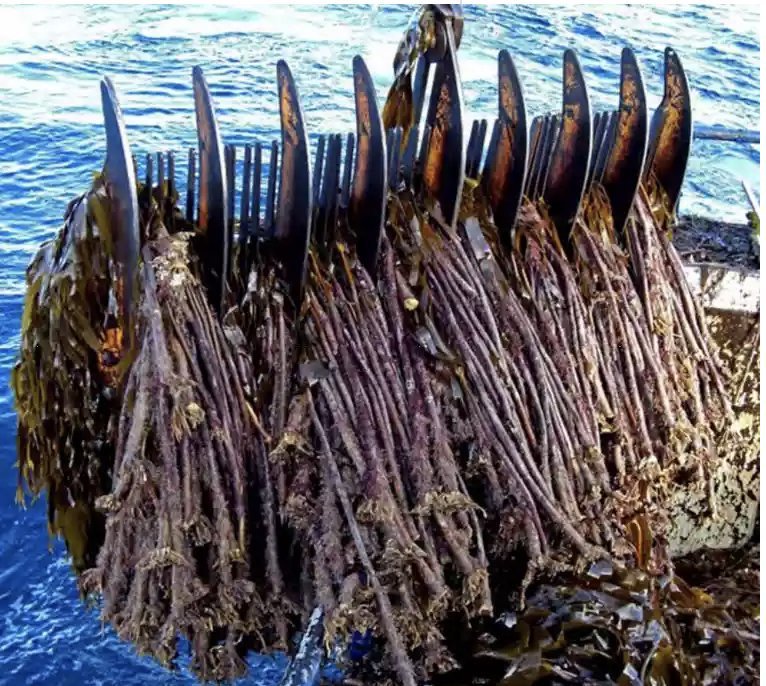Scotland’s seabed ‘rainforests’ are under threat from industry dredging proposals, with potentially significant ramifications for climate change.
Kelp is the generic name for several species of large brown algae seaweed which grow in ‘kelp forests’ in Scotland’s coastal waters. Kelp forests have been widely compared to terrestrial rainforests because of the biodiversity and abundance of flora and fauna they support.
The kelp forests are due to be exploited by a company called Marine Biopolymers, from Ayr, in South West Scotland, which is benefitting from a grant from the Industrial Biotechnology Innovation Centre (IBioIC) that helps microenterprises specialising in industrial biotechnology “maximise the value of seaweed”.
But campaigners claim the process puts the marine environment under threat from the mechanical dredging of large parts of the seabed causing a threat to fish stocks such as Atlantic Cod, Pollock and Saithe (also known as Coley), as well as lobsters, crabs and a host of sealife.
As Ailsa McLellan, an oyster farmer from Ullapool and founder of the ‘No Kelp Dredging’ campaign group, told DeSmog UK:
“Marine Biopolymers wants to tow a large-toothed dredge in strips through kelp beds ripping the entire plant up by the holdfast (killing it), then throw the holdfast over the side to ‘facilitate survival’ of invertebrates. Assuming any invertebrates survive this treatment, where are they meant to go when chucked back over the side? Their habitat is gone, the other invertebrates are not going to ‘budge up’ and make room for them, that’s not how biology works.”
“Moreover, climate change is happening. Its effects, such as increasing acidity and rougher seas, are already being measured in our oceans. Kelp sequesters significant amounts of carbon, buffers acidity, and acts as a storm barrier for coasts.”
However Marine Biopolymers co-founder David Mackie insisted its plans to harvest the seaweed are “entirely sustainable” and that the product would be turned into “eco-friendly bioplastics” which are fully-biodegradebale and could be used high-strength transparent visors and shields for use by the police and armed forces.
The company claims that a ban would “cost Scotland milllions” in unrealised potential and complained that the process was more akin to “combing” the seabed than dredging.
In a leaked exchange seen by DeSmog UK, Dr Mark Dorris at Napier University, the lead scientist on the project claimed:
“As for the amount we will harvest, at full capacity a yearly harvest represents just 0.15% of the total kelp available. To put that into some context that’s the same percentage of your hair you lose naturally every day. It’s also around 1% of the kelp that is lost naturally due to choppy seas.”
But while Marine Biopolymers stands accused by activists of greenwashing the process faces further controversy as the Scottish Government faces accusation of collusion after a Freedom of Information request revealed a senior official from Marine Scotland had told the company they were “keen to see this kind of initiative proceed.”
Crunch Vote
Representatives of the fishing industry and the existing seaweed hand-harvesting sector have now written to Scotland’s Cabinet Secretary Roseanna Cunningham MSP, requesting an urgent meeting ahead of a crunch vote on the future of Scotland’s kelp forests on 21 November.
This follows an earlier letter opposing kelp dredging signed by representatives of more than 500 businesses that rely on kelp forests, after which Parliament’s Environment Committee voted to put a ban on kelp dredging into the Scottish Crown Estate Bill.
Industry leaders are concerned that this ban may be watered down on Wednesday when the whole Scottish Parliament considers the legislation for the final time.
Over the weekend a petition opposing mechanical kelp dredging, launched by Ailsa McLellan, the founder of the ‘No Kelp Dredging’ Facebook campaign, hit 20,000 signatures. The campaign is also backed by the Sustainable Inshore Fisheries Trust, which runs the Help The Kelp campaign, and works to protect both sustainable coastal industries and the marine environment those businesses rely upon.
Alistair Sinclair, national co-ordinator for the Scottish Creel Fishermen’s Federation, who has written to Roseanna Cunningham MSP requesting a meeting, said:
“I implore MSPs to reject any notion of destroying our marine environment any further. If we are to commit to ensuring a living sea and indeed the opportunity to earn a living from the sea for future generations, we must stop this kelp harvesting at such cost in pursuit of personal gain. Kelp is recognised by many within the scientific community as a building block of life below the surface of the sea.”
Image: The proposed dredging areas
Climate Impact
But the issue is deeper than potential environmental destruction. Kelp forests also play an important part in the mitigation of climate change.
They are an important carbon store in Scottish seas, considered one of the main pathways for carbon entering long-term storage in low-sediments (1.8 millions of tonnes of carbon per year) and have the highest carbon sequestration rate for marine habitats in Scotland (1,732,000 tonnes of carbon per year).
Scottish National Heritage’s report into Blue Carbon noted that kelp is the predominant marine plant producer of carbon entering long-term storage. And the Scottish Government’s 2018 Climate Change Plan stated:
“Coastal marine protected areas have stored the equivalent of four years of scotland’s emissions. This research highlights that kelp forests are of particular importance.”
Guy Grieve, founder of the Ethical Shellfish Company, based on the Isle of Mull and employing 18 full-time and part-time staff, said:
“Alongside others from Scotland’s fishing industry, I have this weekend written to Roseanna Cunningham, Cabinet Secretary for the Environment, to see whether we can arrange an urgent meeting ahead of Wednesday’s vote in Parliament. We know from the Norwegian experience that dredging kelp forests disrupts a crucial nursery environment for young fish, and we do not wish to see Scotland’s fish and shellfish stocks face the same threat. The Scottish Government talks a good game about ‘Scotland the brand’, and about being a ‘good food nation’: now it’s time to see if they mean it.
“I cannot understand why hundreds of existing jobs, jobs which will exist indefinitely if we protect our kelp forests, should ever be put at risk for a few dozen short term jobs employing people to uproot those kelp forests. Sometimes economics and the environment appear to point in different directions, but on this issue they go hand in hand. The jobs our sector supports are typically in the coastal communities which can least afford to be put under more pressure.”
“I hope the Cabinet Secretary will take the time to meet with us this week and I hope she will decide to protect the kelp forests our sectors all rely on.”
Image credit: Ailsa McLellan
Subscribe to our newsletter
Stay up to date with DeSmog news and alerts







